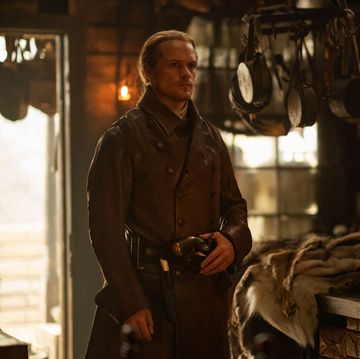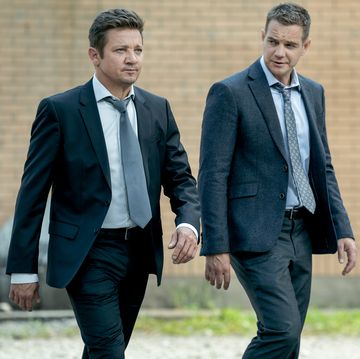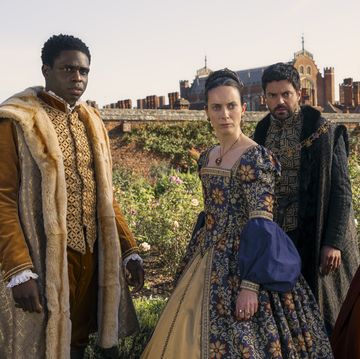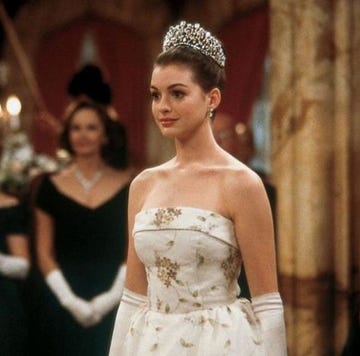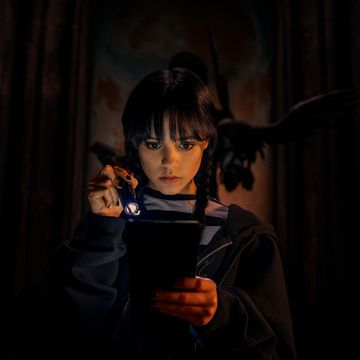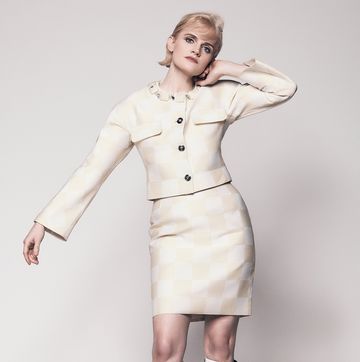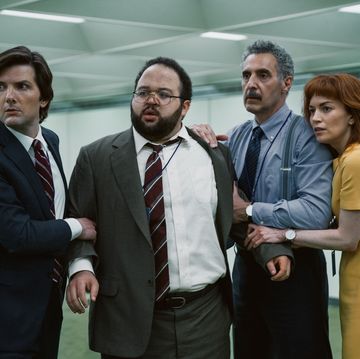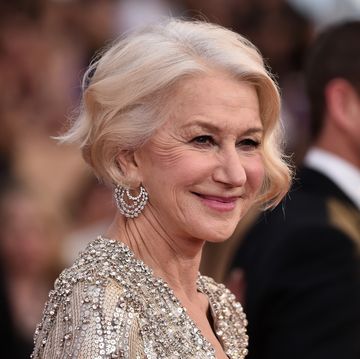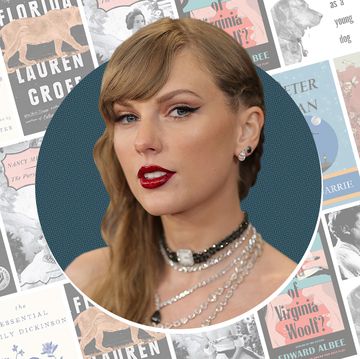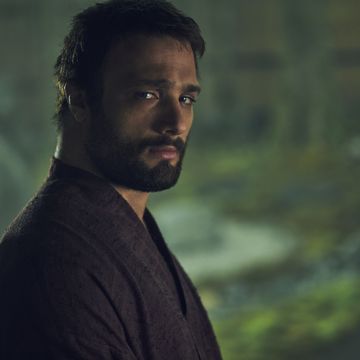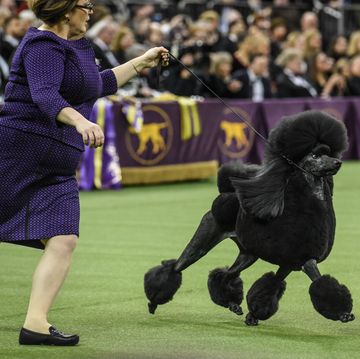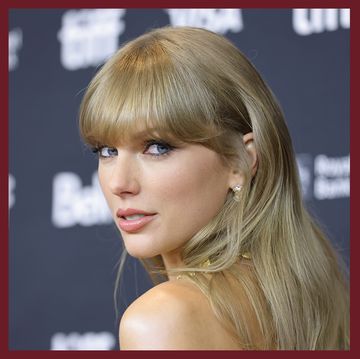"I'm never sure how long I'm supposed to look at it," says Jennifer Connelly, voicing a common concern when faced with a particularly austere piece of conceptual art. We are at the Guggenheim's retrospective of the late Japanese artist On Kawara, the centerpiece of which is a series of paintings meticulously recording the day's date in acrylic, starting with September 20 1966, when Kawara started his series, and ending in 2013, the year before he died. You can tell a lot about a person from the way she views art. Is she a gazer? A flitter? Does she approach the work head-on, or sidle in shyly from the side? Connelly alternates between lightly engaged skimming and bursts of fierce concentration. One series fascinates her in particular: a selection of 111 of the nearly 900 telegrams Kawara sent to friends, over a period of decades, telling them nothing more than "I am still alive."
"I do like these. They're very appealing—sort of witty, even," Connelly says, studying the telegrams intently, one hand folded idly across her chest. "To Sol Lewitt," she reads. "117 Hester Street, New York...I am still alive... On Kawara... February 11th 1970..."'
"Nobody sends telegrams anymore," I say. "They just tweet."
"My husband is on Twitter, but I am not," she says. "I am Miss Analog. I bought my first computer just yesterday."
"Your first?"
Connelly fishes a battered iPhone from her purse, its window severely cracked. She dropped it during a recent skiing holiday in Switzerland and took it in for repairs a few days ago, only to be asked by the Apple technician where she backed up her data. Nowhere, of course. She is now the proud owner of a MacBook Air.
"In college I wrote on an old typewriter," she says as we wend our way up the Guggenheim's circular ramp. Wearing a pair of black jeans, heels, and a black leather jacket accessorized with a Louis Vuitton bag (she is a brand ambassador for the label), Connelly turns heads, but no more than any other beautiful woman would; there is no shoulder tapping or pointing as we move around the gallery. "Anything that we had in our house—which at that point was, like, a CD player—my parents, if it didn't work, would be like, 'Can you fix it? Can you make it work?' I am loath to be that person, and I am that person in my house now—the one who's like, 'Can you please tell me how to print the whatever?' "
I laugh, partly out of relief. I heard Connelly was a tough interview: glaring at reporters from beneath her jet-black eyebrows, lasering unwelcome questions with arctic blasts of froideur. "I'm not the most gregarious person in the room, for sure," she says. "I think by coupling with Paul, that kind of works." Paul being her husband, the British actor Paul Bettany, whom she met on the set of A Beautiful Mind in 2001 and married in 2003. "I'm more reserved. I can be kind of shy in a group. I mean, I manage it pretty well, but he's much more outgoing than I am. Once I'm comfortable with someone, I'm not reserved." When she gets to that point, Connelly adds, "I'm a compulsive confessor."
Claudia Llosa, the Peruvian director, remembers meting with the actress in a bar to discuss Connelly's new film, Aloft, which opened in May; what was supposed to last 20 minutes turned into a wide-ranging three-hour conversation. "I had to cancel all my other meetings," says Llosa. "Jennifer goes in very deep, not just about her character but everyone else's, line by line, page by page. She is driven by the desire to understand why we act the way we do, why we behave a certain way."
We last checked in with Connelly a while ago, when she was laboring through a series of rom-com-ish dramas (He's Just Not That Into You, Stuck in Love, The Dilemma) wearing the expression of Antigone making conversation at a Tupperware party. She took a couple of years off from acting to have her daughter Agnes Lark, in 2011, but returned to screens last year in Darren Aronofsky's Noah, playing Noah's wife Naameh, who fights for her family's lives as the heavens open. "I needed someone who had a timeless look, a timeless beauty," says Aronofsky, who had worked with the actress before, on Requiem for a Dream, the 2000 film that allowed Connelly to pivot from a rather listless career as a teen siren onto the track that would win her critical acclaim for her work in the 2003 movie House of Sand and Fog and an Oscar for A Beautiful Mind. Aronofsky still recalls her audition for Requiem. "She just exploded in the room, and there were chairs flying. I remember taking off my jacket and rolling up my sleeves and going, 'Okay...' I thought that kind of mastery was something you were born with, but I really saw her craft explode for her. She became unbelievably in control of something that's uncontrollable."
Aloft is a mixture of mystical allegory, handheld cinematography, and subzero temperatures. Connelly plays a woman on the periphery of the Arctic Circle, who, after tragedy strikes at the heart of her family, is drawn into the company of faith healers. Put it together with Noah and Shelter—her forthcoming drama about homelessness directed by Bettany—and you have a trio of films pitting Connelly against the elements, scratching out an existence beneath glowering skies. No question—she is in survival mode. She's 44, and her beauty has shed whatever air of sultriness it had in her twenties, acquiring an edge of something altogether more purified, fierce. In Aloft those green eyes seem to contain their own arctic storms.
"I didn't ask my agent to look for heavy weather," she says with a laugh over lunch at the Guggenheim's restaurant, where she orders a beet salad and speaks candidly of the changes in the types of scripts she was sent after the birth of her daughter. "All of a sudden I'm reading scripts where I'm the mother of the woman who's going on the adventure, and just sort of sitting on the sidelines. I was like, 'Wait a minute.' What was interesting was that it seemed to happen so quickly."
Connelly may not be the first aging actress to turn to foreign directors for help in hewing a path through maturity—Nicole Kidman did it with Lars Von Trier and Alejandro Amenábar, Naomi Watts with Alejandro Iñárritu, Salma Hayek with Matteo Garrone—but if anyone thought that casting Connelly as a mother would result in her looking cute and concerned while her son straps himself into a rocket launcher, they miscalculated. Connelly's mothers are as dark and layered as Pacino's gangsters; her character in Aloft joins a throng of mama grizzlies exploring the varied currents running through the maternal bond. Three times in the past several years she has played a woman who loses a child, and twice a mother who, for various reasons, abandons them.
Connelly tells me of her oil painting, which she has pursued on and off since her student days. "I enjoy the observation," she says. "I enjoy noticing how different things appear from how I first imagined them, or when I first sat down to look at them." A similarly layered observation seems to be at play in her screen work. She takes active delight in pushing up errant, gnarled roots, or unearthing hidden currents beneath the well-defended carapaces of the women she portrays. Aloft's Nana is deep of feeling but self-occluded, difficult, damaged in some way. We never doubt that she cares for her children, but it costs her. "Nearly everything she's doing is an example of her love," Connelly says. "But she certainly isn't someone who's sentimental in any way or who displays typically maternal love. There's something steely about her, which is a result of having to protect herself."
Something similar, one suspects, is true of Connelly herself, who grew up primarily in Brooklyn Heights, where she attended the prestigious Saint Ann's School. Her own family history is not something she relishes delving into. Her father Gerard, who in his later years lived with Connelly and Bettany in their house in Brooklyn, died of cancer in 2008; her mother Ilene passed away more suddenly, of a heart attack in 2013. Divorced from Connelly's father since 2000, she had been working as a massage therapist in Big Sur. "He was very much part of our daily lives," she tells me. "And we'd been spending more time with my mother, who for the last year of her life moved back to New York. But before that I wasn't in daily or even weekly contact with her. Given those different rhythms, that feeling you have when they're both gone surprised me—how you feel tethered even when you don't see them physically. It's very strange."
After nine years in Brooklyn, Connelly and her family moved to Manhattan in 2012. Most of their friends lived there, and they were tired of being stuck in traffic. They may even have had too much space in Brooklyn, Bettany says. "We moved from a one-bedroom apartment in the West Village to a nine-bedroom house in Prospect Park where we spent most of our time hanging out in the kitchen. It went from 'Well, this is very grown-up. We've got five floors. We've all got our own space' to 'Don't forget to bring the yogurt up!' Shouting at each other just to be helpful."
Within a few weeks of settling into their new place, Bettany noticed a homeless couple regularly encamped on their block: a woman and a man, African-American, with two huge shopping carts full of books. Then Hurricane Sandy hit, and "in the mayhem of getting everyone to higher ground I didn't stop to think about where they might be sheltering," says Bettany. "I never saw them again." He began to make up backstories for the pair, which in turn became a script about a homeless couple struggling to stay alive on the streets of New York. He showed it to his wife; he knew from Connelly's reaction to previous scripts he had written that she would be brutally honest. "Working with Jennifer as a director is like getting in a gravel shower," he says of their collaboration on Shelter, which opens in September. "It's fucking painful, but you come out so clean at the end of it. You can't help yielding to it, because she is also putting herself through the wringer."
Her next film project is an adaptation of Philip Roth's American Pastoral, to be directed by Ewan McGregor. Connelly plays McGregor's wife, a former Miss New Jersey ("although she's kind of at odds with it") whose daughter, to be played by Dakota Fanning, is radicalized, Patty Hearst–style. Connelly had never met McGregor before, "though Paul worked with him on Mortdecai," she says, mischievously rolling her eyes at the mention of her husband's recent box office bomb.
"McGregor's big on Instagram," I say.
"Oh yeah? Actually, I did know that. I think Paul showed me pictures of his dog."
"And motorbikes."
"Yes, he loves his motorbikes. Maybe one day I'll get on there... I'll probably at some point get involved in Instagram and things like that because I feel it's reality and it's the way people communicate." She pauses. "I don't know. Possibly."
As if on cue, her phone rings. It's Paul asking if she can pick up the kids from school today. She tells me her 17-year-old, Kai (her son with photographer David Dugan), and her 11-year-old son, Stellan, take African dance, and "tonight it's Kai's recital."
Humming with a mother's excitement, she makes her way to the street, hoisting an arm for a taxi, all thoughts of pain, parental loss, and longing shelved until she steps in front of the camera again.
See a behind-the-scenes look at our interview with Jennifer Connelly below and pick up our June/July issue for more with the actress:



